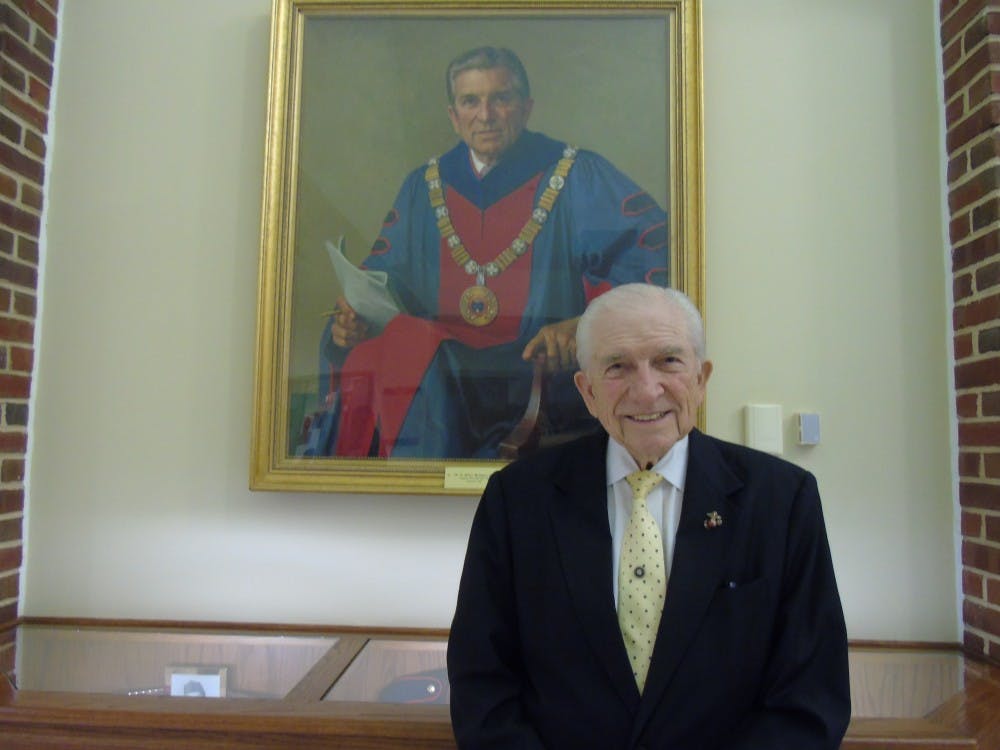Chancellor E. Bruce Heilman, president of the University of Richmond from 1971 through 1986 and again from 1987 to 1988, died Saturday night at 93.
President Ronald A. Crutcher informed the UR community of Heilman’s death in an email Sunday afternoon. The announcement is also on UR’s website.
“During my presidency, Dr. Heilman has always been generous with his friendship and wise in his counsel, and I have been profoundly grateful for his example,” Crutcher said. “He was a daily presence on campus, a beloved guest and frequent speaker at University events, and a personal friend to countless alumni across generations.
“We will miss the benevolent spirit with which he shaped our campus community for nearly 50 years, and we offer our sincerest condolences to his family and their many, many friends.”
Heilman was born in rural Smithfield, Kentucky, as the son of a tenant farmer, according to the Richmond Times-Dispatch. He spent his childhood during the Great Depression and served in the U.S. Marine Corps during World War II at age 17, fighting in Okinawa, Japan, and surviving a plane crash on Iwo Jima.
Upon returning to the U.S., Heilman attended and graduated from Campbellsville Junior College -- now Campbellsville University -- and later earned his bachelor’s, master’s and doctoral degrees at Peabody College, which is now part of Vanderbilt University. Heilman also served as coordinator of higher education for the state of Tennessee and as president of Meredith College, Crutcher wrote.
Heilman is also nationally famous for traveling thousands of miles across the U.S. on his motorcycle as an octogenarian and nonagenarian, speaking about and honoring World War II veterans, according to the Times-Dispatch.
Senior cadet Michael Horan described the former president as soft-spoken, gentle and accomplished. Nearly one month ago in the dining hall, Horan asked Heilman to attend the ROTC military ball as a special guest, he said.
“When I went over, he just had the biggest smile and he was so happy to see me,” Horan said. “And he was just saying how he would totally want to come, and I’m sure if he was still here he would have made it a point to go to that.
“[Heilman] says his time in the service was probably his proudest thing he ever did, and he was talking about how there needs to be good young leaders in the world today.”
Former UR chaplain the Rev. David Burhans, who was close to the Heilman family, said that Heilman had been a very compassionate, active, caring and happy leader of UR. Heilman was also very successful in fundraising, Burhans said.
“Dr. Heilman seemed like he never met a stranger,” Burhans said. “He was greeting people in such a happy, positive way. He's one of the most positive and affirming people I have ever met.”
Enjoy what you're reading?
Signup for our newsletter
Burhans was appointed UR’s first chaplain by Heilman in 1974 and held the position until 2004, Burhans said.
“He helped me understand that I was not just the pastor to a particular religious group but the pastor to all the university community, people of all faiths, people of no faith persuasion, and I loved that position,” Burhans said. “So the chaplaincy at UR is very affirming, open and receptive to people of all faiths and of no faith, and Dr. Heilman wanted it that way. And that’s one of the reasons I stayed with this position full-time for 30 years.”
Heilman led the university “through an era of profound transformation,” Crutcher wrote.
During his tenure as president, Heilman oversaw the construction of a number of campus buildings, including the Robins School of Business, the Gottwald Center for the Sciences, Tyler Haynes Commons and the Robins Center basketball arena, Lora Robins Court and Gray Court, Crutcher wrote.
“It’s just hard to imagine how much this university has changed in the last forty years,” said Joe Ben Hoyle, an associate professor of accounting who has worked at UR since 1979. “And it wouldn’t be anywhere near as vibrant if it hadn’t been for his leadership and his enthusiasm.”
In 1986, UR named its dining hall the Heilman Dining Center, which was also built during Heilman’s tenure, Crutcher wrote.
Heilman’s imprint on this campus is momentous and far-reaching for every living Spider, Crutcher said in his statement.
So is his love for UR, Hoyle said.
“I teach in the business school and a lot of people who run organizations are good at running organizations,” Hoyle said. “And they’ll just run whatever organization, whether it’s Ford Motor Company or AT&T– they’re just built to run organizations. Dr. Heilman was built to run the University of Richmond.
“He really was, he really was great at that. And I think it was just that he loved learning, he loved education and he just loved the University of Richmond.”
The UR flag will fly at half-staff from Sunday, October 20, through Sunday, October 27, in recognition of Heilman’s passing.
Heilman’s memorial service will take place 2 p.m. Sunday, Oct. 27, in Cannon Memorial Chapel. His ashes will be interred in UR’s columbarium alongside those of his wife, Betty Dobbins Heilman, who died in 2013.
Editor's Note: The views expressed by the cadet in this article are his own and do not reflect those of the University of Richmond ROTC program, 4th Brigade or Cadet Command.
Contact managing editor Arrman Kyaw at arrman.kyaw@richmond.edu.
Managing editor Lindsay Emery and editor-in-chief Jocelyn Grzeszczak contributed to reporting.
Support independent student media
You can make a tax-deductible donation by clicking the button below, which takes you to our secure PayPal account. The page is set up to receive contributions in whatever amount you designate. We look forward to using the money we raise to further our mission of providing honest and accurate information to students, faculty, staff, alumni and others in the general public.
Donate Now



